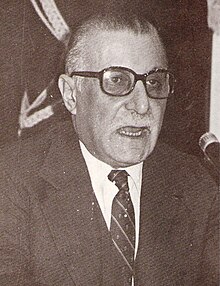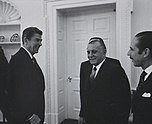Roberto Eduardo Viola
This articleneeds additional citations forverification.(September 2009) |
Roberto Eduardo Viola | |
|---|---|
 Viola in 1981 | |
| 48thPresident of Argentina | |
| In office 29 March 1981 – 11 December 1981 | |
| Vice President | Vacant |
| Preceded by | Jorge Rafael Videla |
| Succeeded by | Horacio Tomás Liendo(acting) |
| Personal details | |
| Born | 13 October 1924 Buenos Aires,Argentina |
| Died | 30 September 1994(aged 69) Buenos Aires,Argentina |
| Political party | None |
| Spouse | Nélida Giorgio Valente[1] |
| Children | 2[1] |
| Profession | Military |
| Signature |  |
| Military service | |
| Allegiance | |
| Branch/service | |
| Rank | |
Roberto Eduardo Viola(13 October 1924 – 30 September 1994) was anArgentinemilitary officer who served as the 48thPresident of Argentinaand the 2ndPresident of the National Reorganization Processfrom 29 March to 11 December 1981 as amilitary dictator.[1]
Early life[edit]
He was born asRoberto Eduardo Violaon 13 October 1924. His parents wereItalianimmigrants Angelo Viola and Rosa Maria Prevedini, both fromCasatisma,a town in theProvince of Pavia.[2]
Presidency (1981)[edit]
AfterJorge Rafael Videlaleft office, Viola formally assumed the post ofPresident of Argentina.
Economic policy[edit]
Viola appointedLorenzo Sigautas finance minister, and it became clear that Sigaut were looking for ways to reverse some of the economic policies of Videla's ministerJosé Alfredo Martínez de Hoz.Notably, Sigaut abandoned the slidingexchange ratemechanism and devalued thepeso,after boasting that "they who gamble on thedollar,will lose ". Argentines braced for a recession after the excesses of thesweet moneyyears, which destabilized Viola's position.[3]
Viola was also the victim of infighting within thearmed forces.After being replaced as Navy chief,Eduardo Masserastarted looking for a political space to call his own, even enlisting the enforced and unpaid services of political prisoners held in concentration camps by the regime. The mainstream of the Junta's support was strongly opposed to Massera's designs and to any attempt to bring about more "populist"economic policies.
Foreign policy[edit]

Argentina-United States relationsimproved dramatically with theRonald Reaganadministration, which asserted that the previousCarter Administrationhad weakened US diplomatic relationships withCold Warallies in Argentina and reversed the previous administration's official condemnation of the junta'shuman rightspractices.[4]
The re-establishment of diplomatic ties allowed forCIAcollaboration with the Argentine intelligence service in arming and training the NicaraguanContrasagainst theSandinistagovernment. The601 Intelligence Battalion,for example, trained Contras atLepateriquebase, in Honduras. Argentina also provided security advisors, intelligence training and some material support to forces inGuatemala,El SalvadorandHondurasto suppress local rebel groups as part of a U.S.-sponsored program calledOperation Charly.[5]
Ousted in a coup[edit]
Viola found his maneuvering space greatly reduced, and was ousted by a military coup in December 1981, led by the Commander-in-Chief of the Army, Lieutenant GeneralLeopoldo Galtieri,who soon became President. The official explanation given for the ousting was Viola's alleged health problems. Galtieri swiftly appointedRoberto Alemannas finance minister and presided over thebuild-upand pursuit of theFalklands War.
Later years[edit]
After the collapse of the military regime and the election ofRaúl Alfonsínin 1983, Viola was arrested, judged forhuman rightsviolations committed by the military junta during theDirty War,and sentenced to 17 years in prison. His health deteriorated in prison; Viola was pardoned byCarlos Menemin 1990 together with all junta members. He died on 30 September 1994, at age 69.
See also[edit]
References[edit]
- ^abc"Roberto Viola, 69, Who Headed Argentine Military Dictatorship".The New York Times.2 October 1994.
- ^"Viola".
- ^La nueva política económica argentina se basa en la modificación del esquema de cambios de la moneda. Según Lorenzo Sigaut, el nuevo ministro de Economía,El País, reproducción del artículo publicado el 8 de abril de 1981.(in Spanish)
- ^Rossinow, pp. 73, 77–79
- ^"Los secretos de la guerra sucia continental de la dictadura",Clarín,March 24, 2006(in Spanish)
- Acting presidents of Argentina
- 20th-century presidents of Argentina
- 1924 births
- 1994 deaths
- Politicians from Buenos Aires
- Military personnel from Buenos Aires
- Recipients of Argentine presidential pardons
- Argentine people of Italian descent
- Argentine generals
- Colegio Militar de la Nación alumni
- Burials at La Chacarita Cemetery
- 20th-century Argentine politicians
- Heads of government who were later imprisoned
- Argentine politicians convicted of crimes
- Grand Crosses of the Order of the Liberator General San Martin
- Grand Crosses of the Order of the Sun of Peru
- Leaders ousted by a coup
- Prisoners and detainees of Argentina

